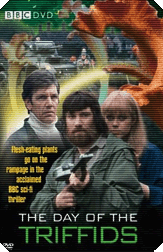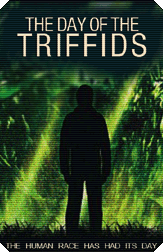The Day of the Triffids
Reviewed by Galen Strickland
John Wyndham's The Day of the Triffids, along with inspiring other similar stories, has itself been adapted to film on three different occasions. The first came in 1962, with the theatrical feature that starred Howard Keel and Nicole Maurey. To put it bluntly, this is a horrible movie, although I recall liking it when I first saw it, but that was when I was much younger and less discerning, as well as years before reading the book. Not only is it a bad adaptation, the writing, acting and special effects are inferior to several other films from around the same time period.
The movie postulates that the Triffid plants are of alien origin, their spores first landing on Earth during the meteor shower, whereas in the book they were hybrids created in a laboratory in Russia in an attempt to produce a plant that would secrete an oil-like substance to be used as a food source and a fuel. The book's protagonist was a scientist working on a Triffid farm, but in this film he is an American sailor. He is in the hospital for eye surgery, there is a meteor storm, and most people are blind. Other than that, the screenplay took enormous liberties with the story, and not only created two characters (played by Kieron Moore and Janette Scott) that are not in the book, their sub-plot has very little to do with the rest of the film, except for the ridiculous denouement in which they discover the solution to the Triffid menace.
All of the action in the book takes place in various areas of Great Britain, with mentions of a community of survivors gathered on the Isle of Wight. In the movie, Masen and two comrades take a small boat across the Channel to France, where they commandeer a vehicle to drive to Paris, and later to Spain. They still can't escape the Triffids, so that journey made little sense. You can probably find this playing on various cable channels occasionally, and it is inexplicably on DVD while more deserving films are either out of production or have never been released on the format. But even if you get the chance, I say avoid it.
 |
On the other hand, the 1981 BBC mini-series is recommended for sticking very closely to the book's plot, as well as featuring good acting and adequate effects considering the limited budget. The most impressive thing for an actor to do, especially in a genre piece, is to take the work seriously so that it is easier for the audience to suspend their disbelief and accept the premise as a credible one. Such is the case here. I'm not familiar with the actors from anything else, although checking their resumes I know some have had minor roles in other films or TV shows I have seen, or at least have heard of. John Duttine plays Bill Masen with intelligent subtlety, quite different from Howard Keel's nonchalant swagger or Dougray Scott's brooding action-hero posturing in the 2009 remake. He also has believable chemistry with Emma Relph as Jo Payton, a woman he rescues, who later is a very good friend, then lover, then wife. One of the most interesting characters in the book is Jack Coker, portrayed here by Maurice Colbourne. He begins as somewhat of a villain, then later a confidant and partner to Bill and Jo, and the writing and Colbourne's performance is just right to make those transitions convincing.
Of course, the Triffids are still around, but they don't overwhelm the human drama, and the effects that bring them to life are actually better than the later series which surely had a higher budget. This series retains the fact that Masen is a biologist who has been researching Triffids for several years, so he knows of their danger and reacts accordingly when he realizes what has happened to the majority of other people. The production is less than three hours, six episodes of slightly less than thirty minutes each, which is sufficient to tell the story adequately and very little of the book's action is deleted. It is unfortunate that the DVD set costs more than both of the other versions combined, but I would like to see it again some day, so I guess I'll rely on Netflix again.
 |
Sometimes film and TV studios just don't know when to leave well enough alone. Although the 2009 mini-series has an impressive cast, the screenplay is lacking the necessary hook to get you to care about what happens to any of them. It retains about half of the plot from the book, then fabricates the rest. Eddie Izzard's character is from the book and the earlier mini-series, but his role is expanded quite a bit, but in this case it is hard to feel the menace the character should exhibit. His performance is more comical than villainous, definitely not what the story needed, and he deserves the fate he receives in the end.
I couldn't sense any chemistry between Scott and Richardson, and Jason Priestly is miscast as Coker. Vanessa Redgrave's character is in the book, but also changed quite a bit, and in a totally off-the-wall plot twist, she becomes something as dangerous as the Triffids. I don't blame any of the actors for this, because it's the writing and direction that are at fault. It's about the same length as the other series, although in this case it is two parts of about ninety minutes each. They may have done a better job if they had limited it to around two hours, cutting half of Izzard's scenes and eliminating Redgrave's altogether. Just as with the first movie version, I say steer clear of this one.
Related link:
My review of Wyndham's novel.
Would you like to contribute an article on your favorite SF, Fantasy or Horror movie or television show?
Just email me.
We would appreciate your support for this site with your purchases from
Amazon.com and ReAnimusPress.